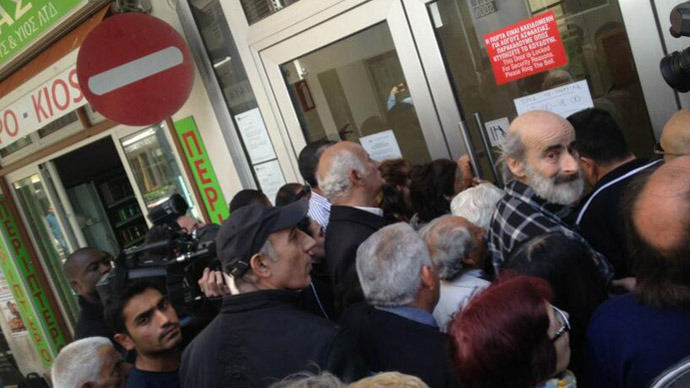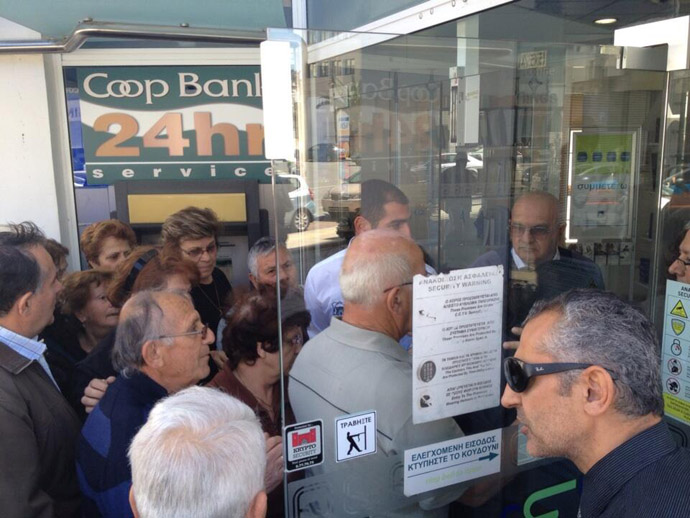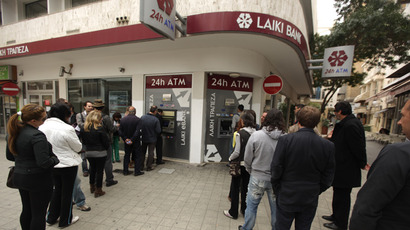Cyprus reopens banks with strict limits on transactions

The doors of banks in Cyprus have been opened for the first time since March 16. Officials have set strict capital flow controls to offset a bank run.
Follow Cyprus banks reopening in RT's LIVE
updates
The EU bailout announcement forced banks to remain closed until
12:00 local time on Thursday. The thousands who are expected to
withdraw funds won’t be walking away with bulging wallets, because
of the capital controls.
The Ministry of Finance announced the measures, which they say are temporary, last Wednesday evening, and stressed they are necessary to "safeguard the stability of the system".
“Please, let’s all be calm and be careful not to create more problems,” Yiangos Dimitriou, the head of internal audit at the Central Bank, said. “It will serve no purpose for us to run to banks and try to find ways to get money. To get it where?”
The restrictions are expected to be in place for at least a
week, and their effectiveness will be monitored on a day to day
basis. In addition, anonymous officials told AP that savers with
over 100,000 euro in their accounts could lose up to 60 per cent of
their funds.
Finance Minister Michael Sarris foresees the controls being lifted in a ‘matter of weeks’, others fear they could drag on for years, as they did in Iceland after their 2008 banking collapse. Iceland still operates under a controlled currency, with strict capital restrictions. Iceland has delayed its decision to switch to the euro until after next month's elections.
Bob Lyddon, the general secretary of the international banking association IBOS, described the controls as "more reminiscent of Latin America or Africa". "These are permanent controls until the economy recovers," Lyddon told the Guardian.

The main restrictions in Cyprus aim at keeping as much capital in the country, while at the same time granting a limited access to bank customers.
A cash withdrawal limit has been set at 300 euros ($383) per day and checks will not be accepted as tender.
Border regulations will also tighten, and travelers can only have 1000 euro in their pocket.
Any payments or transfers over 5,000 euro will need special approval from the Central Bank and any amount over 200,000 euro will be examined case by case.
"The stability of financial markets and the banking system in Cyprus constitutes a matter of overriding public interest,” the European Commission said on Thursday.
The Cyprus Central Bank expects 10% of capital to be withdrawn once banks open. Already, a high security aircraft has delivered at least 5 billion euros in cash to satiate the expected re-opening demand.
Cypriot officials have been engulfed in a balancing act between appeasing the populace and salvaging its banking industry by securing a bailout package from the EU.
The first EU bailout plan was met with stark opposition, and forced the island’s banking sector to essentially shut down while officials scurried to find a solution. On Monday, the final provisions were made to the bailout conditions and the Cyprus government handed down the EU mandate to shut down the Cyprus Popular Bank (known as Laiki), and to heavily tax uninsured depositors at Bank of Cyprus, to raise money for the 10 billion euro ($12.9 billion) bailout.
Moody’s has lowered Cyprus’ credit rating to ‘Caa2,’ explaining that the country’s risk of exiting the euro zone has increased. The outlook for Cypriot government bonds rating remains ‘negative.’
According to the international ratings agency’s report, the restructuring of the country’s two largest banks and impending capital controls increase the chances Cyprus will have to exit the euro zone. Earlier this week, Fitch placed Cyprus on a ‘negative watch,’ deeming the country’s ceiling to be a ‘B’ level.
There are over 64 billion euros deposited in Cyprus.
The Athens Stock Exchange index dropped 4 percent Wednesday, and has dropped over 12 percent since the banks closed on March 16. The Cyprus Stock Exchange remains closed. The capital regulations will not apply to new money deposited after March 27, international transactions, and diplomatic affairs.
Meanwhile the team from the troika of lenders – the International Monetary Fund, European Union and European Central Bank is in Cyprus and working on technical details of the bailout program for the troubled island. They are determining how much the IMF contributes to the package and the final decision won't be arrived at before the end of April, an IMF spokesperson told reporters on Thursday.
"We expect the work of that mission to conclude in early
April. After that our executive board will need to discuss the
possible financing arrangement for Cyprus, so I would therefore not
expect a final decision on a financial package from the IMF before
the end of April," Rice said.














